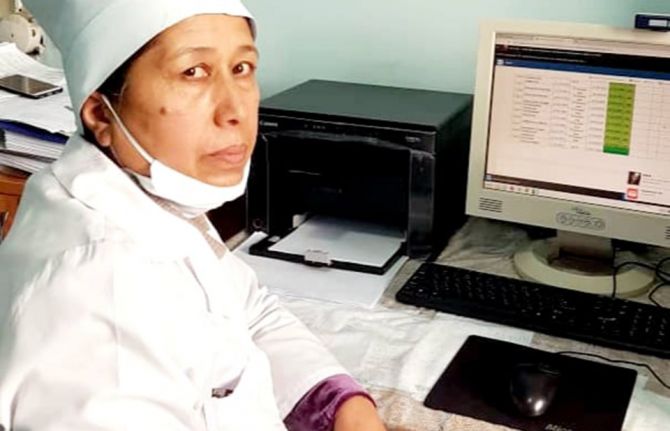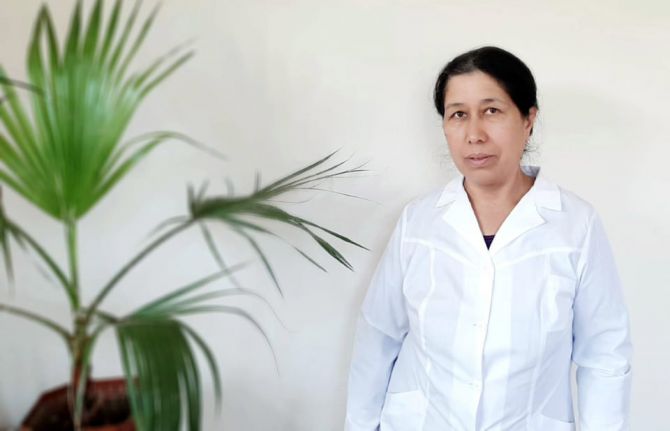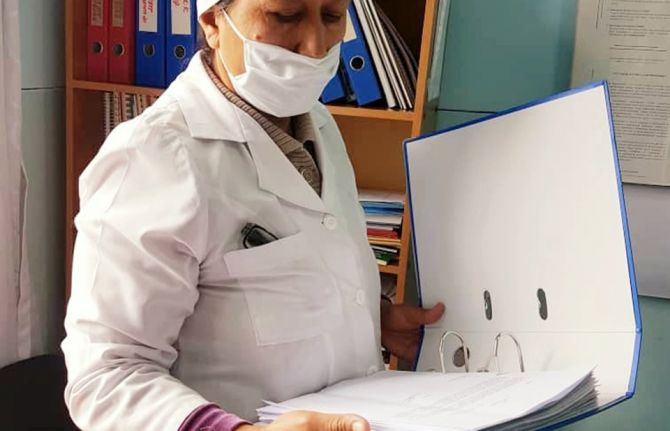



Feature Story
“We are human, so of course it was scary”
13 May 2020
13 May 2020 13 May 2020She is sitting opposite, dressed in a lab coat, and you know that with her you are in safe hands. Her kind eyes convey empathy. Malikakhon Kurbanova, known to all who know her as Malika, has been a nurse at the Kyzyl-Kiya family medical centre in Kyrgyzstan for almost 20 years.
Part of one of 10 pilot multidisciplinary teams specializing in infectious diseases in the country, she has been working with people living with HIV for many years. The multidisciplinary teams were formed by UNAIDS in 2013 and include a specialist in infectious diseases or a family doctor, a nurse and a peer consultant. The teams aim to improve the quality of medical and social services for people living with HIV and their families. During the COVID-19 outbreak they are receiving extra financial help from a Russian technical assistance programme.
Like many health-care workers, Malika has been caught up in the fight against COVID-19. UNAIDS met her recently in her office in the clinic, adjacent to a blossoming apple orchard, and spoke to her about her background and work.
Why did you decide to become a nurse?
When I was a child, I was quite often sick. My mother and I spent a lot of time in hospitals. I always admired the women who wore lab coats and who knew how to inject me painlessly. I knew then that I would become a nurse and help people. When I graduated from school in 1986, I entered the Kyzyl-Kiya medical college and after that, in 1989, I went to work in the health unit in a construction materials plant. That is how my story began. In the beginning of the 2000s the reform of primary health care started and family medical centres were created. I came to work as a nurse and soon joined the infectious diseases unit, where I still work.
You have been working in the COVID-19 response since the very start of the epidemic in the country. Were you frightened?
We do house-to-house visits, helping people with acute respiratory infections. We are human, so of course it was scary—I was afraid about infecting my family.
It is frightening when you are fighting an unknown virus. In the beginning, I did not know what I should tell patients. At the beginning of the pandemic, many people did not believe the truth about COVID-19; some of them accused us of trying to infect them. But over time, people realized that the virus was real, which greatly helped our work.
You work as a nurse in a multidisciplinary team for people living with HIV. How has your work changed since the COVID-19 outbreak started?
To avoid people running out of their medicine and to reduce their possible exposure to people with COVID-19, we are now distributing three-month supplies of antiretroviral therapy, when before we gave out one-month supplies.
We also focus on psychosocial support for people living with HIV. People need mutual support. Our peer consultant calls patients every day and holds online self-help groups via WhatsApp. Thanks to the financial support given to the project, the transport costs of visiting clients and monitoring their adherence to antiretroviral therapy is covered. The most vulnerable people living with HIV have been receiving food packages since April.
What is the hardest part of your work?
We’ve always had difficulties and they are likely to continue, that is the nature of our work! Sometimes I feel like leaving it at behind, but then I realize that this is my life—I am a nurse. It gives me strength when I see that my actions for my patients bring results and people get better.


